Bayern Flashback: The Inconspicuous Rise To The Top
NOTE: This article was written by Eskender Tamrat. Some of his other work can be found at the Bundesliga Fanatic and of course you can follow him on Twitter.
In contrast to its successor, CONMEBOL sides came out victories in 22 of the 43 Intercontinental Cup tournaments before its absorption to the Club World Cup in 2005. You might simply put that down to the emerging daylight between European clubs and the rest of the world, as eight Champions League winners crowned de facto world club champions by beating their respective Copa Libertadores holders in the last ten Intercontinental Cup finals.
But, as it is the case with almost everything, it will look different if you insist on delving into the details. Two of the last eight European teams to won the Intercontinental Cup did so via penalty shoot-outs and another one in extra-time. All in all, only Borussia Dortmund (1997) and Real Madrid (2002) recorded two-goal margin victories – with both insurance goals arrived in the final five minutes – whereas Manchester United (2008) and Barcelona (2009) were the only European teams to win the Club World Cup final by a single goal margin.
The long-awaited debut
Five-time European champions FC Bayern had its moments in both competitions. Due to the infamous 1960s hostility of the Intercontinental Cup and their prioritizing of the league play, the Bavarians declined a chance to participate in the wake of winning their first European Cup title in 1973, leaving finalists Atlético Madrid to became the only side bestowed world champions despite losing their respective continental title.
Bayern retained their crown the following year, but they somehow couldn’t agree on a suitable date for the showdown with the then South American champions Independiente. They became the second team to become European champions for three years in a row in 1976, and their ensuing Intercontinental Cup debut saw them face fellow rookie side Cruzeiro.
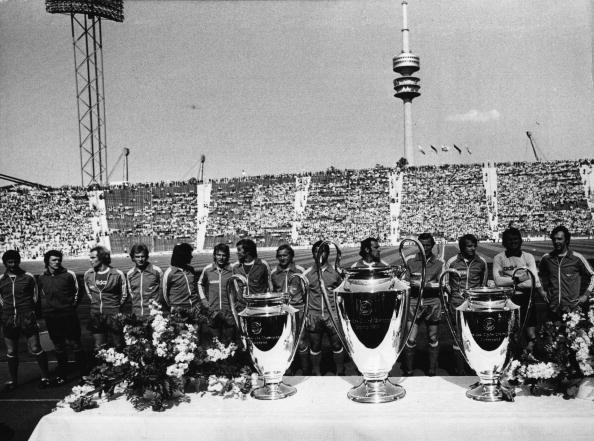
(Photo: Keystone/Getty Images)
A star-studded side consisting some of the current Bayern officials – honorary president Franz Beckenbauer, CEO Karl-Heinz Rummenigge and, Uli Hoeneß, who is currently seeking a second stint as the club president – eased to a 2-0 win in Munich. The iconic Gerd Müller and fellow 1974 World Cup winner Jupp Kapellmann broke Cruzeiro’s resistance in the final ten minutes before a goalless draw in Brazil ensured Bayern become the world champions at the first time of asking.
The nightmarish Champions League campaigns damaged Pep Guardiola’s legacy at Bayern. But the Spaniard wrote a unique history – albeit the treble season under Jupp Heynckes played a huge role – with triumphs in the UEFA Super Cup and the Club World Cup earning Bayern a unique privilege of becoming the only European team to win all six major international titles.
Ajax and Juventus are the only teams who could repeat the feat in the future, as they are the only other sides to win the Intercontinental Cup in addition to the three main European competitions (including the Cup Winners’ Cup, which folded in 1999). Bayern has a perfect record in Intercontinental Cup/Club World Cup, as they also narrowly found a way in their only other appearance in 2001.
Road to the final
Bayern was on the wrong end of the most adventurous final in the European Cup history – before the agony of losing to Chelsea in their own backyard in 2012, no less – but they never get due appreciation for their own five jewels in Europe’s elite tournament. Borussia Dortmund (with their 1996-97 success under Ottmar Hitzfeld) is the only club to win the trophy before (or after) facing Bayern in the European Cup final.
Atlético Madrid, Leeds United and St. Etienne fans still look back in regret of missed chances as the tiniest of margins proved the difference en route to Bayern’s early-1970s dominance. The 2012-13 win against Dortmund in the first-ever all-German final was nothing less than Bayern deserved after successive disappointments, but Arjen Robben’s redemption arrived late in Wembley.
There is little doubt on the least popular trophy, though. Bayern played out a dull goalless draw against Valencia in the 2001 Champions League final before Oliver Kahn pipped his opposite number Santiago Cañizares in the penalty shoot-out. The worst Champions League final to date – at least the AC Milan Vs. Juventus that followed a couple of seasons later had a wildcard of being a good old Italian tactical battle – hindered Bayern’s stunning previous rounds wins in Old Trafford and Santiago Bernabéu.
In their first meeting since the injury-time debacle at Camp Nou, Bayern cruised to the semifinals, with Paulo Sergio coming off the bench to seal a late winner against Manchester United in the first leg. There was no sight of a comeback from Sir Alex Ferguson’s troops after first-half goals from Giovane Elber and Mehmet Scholl in the return leg.
The reigning champions Real Madrid were Bayern’s next opponents in the last four. Bayern defeated Madrid in their own backyard for the second year running – in comparison, English teams waited until 2006 to record their first win. Elber shipped in the solitary goal in Bernabéu, although the hosts dominated the proceedings.
Vicente Del Bosque’s star-studded side saw much of the ball in the return leg, too, but it was clear who was determined to reach the final. Bayern nearly doubled their advantage right from the kick-off, as Scholl and Elber vigorously surged forward, and Iker Casillas had to react to block a tame shot from the latter. Elber involved in Bayern’s next chance a couple of minutes later when his effort from a tight angle parried away by Casillas, who – at the age of 19 – became the youngest ever goalkeeper to win the trophy the previous season.
Bayern’s deserved lead arrived courtesy of a goal-mouth tussle in the eighth minute. Again Scholl and Elber played their parts, with the Brazilian striker headed home from a close range after Scholl’s corner kick created havoc in Real Madrid’s defense. A mere ten minutes later, Madrid pulled one back with a well-worked strike – Roberto Carlos played a pinpoint long ball to Raul, who showed an impeccable ball control before setting up Luis Figo for a composed finish.
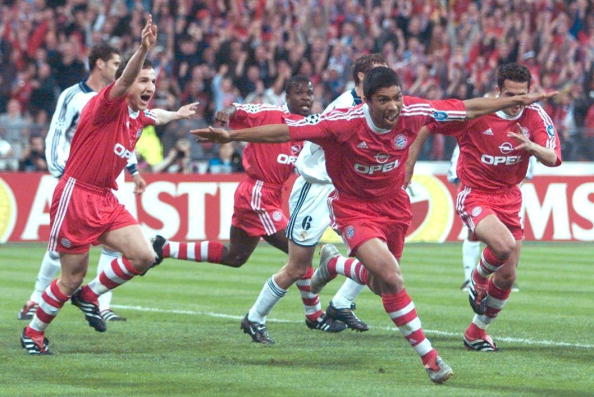
(Photo: Martin Rose/Bongarts/Getty Images)
But that was the only time the visitors lived up to their billing. Despite their midfield stocked with a wealth of quality and balance (Claude Makélélé was still at their ranks), the record champions looked haplessly clueless to create an opening against a Bayern side camped in their own box for the remaining vast majority of the match.
The last straw arrived ten minutes before half-time when Bayern restored their two-goal aggregate lead with a move straight from the training ground. Jens Jeremies, who risked his career by making his return only two weeks after a knee injury, stunned Casillas with a measured strike after Scholl played a free-kick short on the edge of the penalty box.
Game of penalties
The laborious, and yet comfortable, win takes its toll on Bayern players, though. Jeremies missed the final against Valencia, as he remained on the sidelines for some eight months after his heroics. In Owen Hargreaves, who also played the return leg against Madrid due to skipper Stefan Effenberg’s suspension, Bayern fans hoped the young British-Canadian would provide flair in place of Jeremies’ gritty attitude.
Valencia had their own emerging prospect in the form of Argentinian wizard Pablo Aimar, who lined up alongside star player Gaizka Mendieta in midfield. But their heavy defeat in the previous final against Real Madrid led to a natural feeling of not expecting an adventurous Valencia side in San Siro showdown. That meant the hard-working Bayern side went to the final as favorites, and they were the ones expected to take the initiative.
It was Valencia who drew first blood, however, as Norwegian striker John Carew played a teasing ball from the right flank after knocking Samuel Kuffour off his perch. Four days after breaking the hearts of Schalke’s faithful with his title decider last-minute indirect free-kick goal at Hamburg, Patrik Andersson penalized for a handball under the pressure of Mendieta. The Swedish international could have been off the hook if the incident happen under the revised rule, as there was no deliberate handball in his desperate attempt of defending after he went to the ground.
Barely three minutes have passed from kick-off time when Mendieta dispatched the resulting penalty kick to send Valencia to an unprecedented territory. Another three minutes later, the Dutch referee Dick Jol pointed to the spot in the opposite direction when Jocelyn Angloma fouled the onrushing Effenberg. With countless injury problems, Scholl had to work his socks off to feature in this final, and now he had a chance to draw Bayern level from the spot, and relinquish the horror of missing a golden chance against Manchester United two years ago.
Instead, he crumbled under huge pressure from the fervent Santiago Cañizares (if not by the bad pitch condition he was talking about afterwards) as the Spain international made the save with his legs. There seemed to be five fouls for every goal attempt and dead-ball situations present the only hope for a score change. Scholl had a much better effort from free-kick as he narrowly missed the target with a dipping shot.
Seeing the threat posed by Carew, Hitzfeld send his own lanky target man Carsten Jancker for the second half. Only five minutes after his introduction, Carbone conceded a penalty for a handball when he was in an aerial duel against the physically imposing Jancker. Effenberg stepped in this time to fire the equalizer in an emphatic manner.
The trend of the game continued – they huffed and puffed, you know – but the (relatively) best chances carved by Valencia. Slovenian maverick Zlatko Zahovic fluffed a couple of chances after entering the foray, while Mendieta remained the driving force of Valencia’s attacking play. As it has been the case with most of the dull games – recap Euro 2016 to get an idea – the game improved in extra-time.
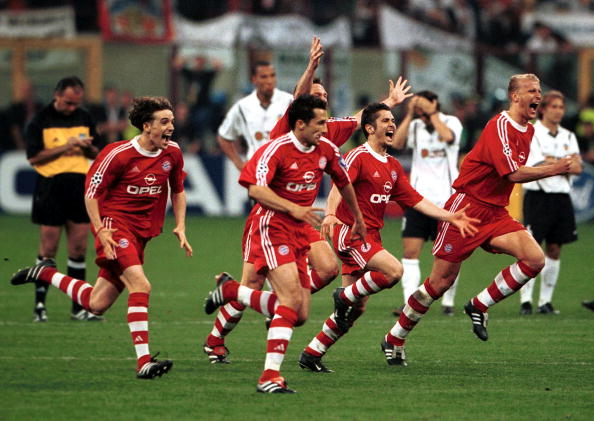
(Photo: Alex Livesey/ALLSPORT)
But there was no breakthrough after the 120 minutes of play, and the teams head to penalty shoot-out. After Paulo Sérgio started things off by sending his spot-kick wide, Mendieta converted his second penalty of the night to gave Valencia an early lead. In his last kick before moving to Barcelona, Andersson saw his weak effort gathered by Cañizares, but Kahn made brilliant saves from Zahovic and Amedeo Carboni. After five converted penalties at either end, Kahn made another point-blank save from Pellegrini to secure Bayern’s first European Cup title in 25 years.
Tokyo delight
A week before England’s famous 5-1 win against Germany in a World Cup qualifiers staged in Munich, Bayern lost the UEFA Super Cup to Liverpool, with the same attacking trio of Steven Gerrard, Emile Heskey and Michael Owen took the center stage before Hitzfeld’s substitutions made the difference to keep the final score at a respectable 3-2.
Bayern went to the Confederation Cup in crossroads both on and off the pitch. After nine successive league wins, they only gathered a single point from the last two matches. Former club legend Lothar Matthäus insisted the club should move on from Effenberg – whose mere three appearances coincided with the only times the team failed to score in the league play.
There was no love lost between the two midfield generals, even when they played for the same team, and Effenberg topped it off by reserving a blank page entitled “What Lothar Matthäus knows about football” in his autobiography two years later. But the man who was known by his Der Tiger nickname couldn’t find his feet in Bayern after being named the Champions League final MVP and UEFA Footballer of the Year.
His continuing injury woes led Effenberg to miss the trip to Tokyo, leaving a place for another veteran Thorsten Fink to operate the play from the middle of the park. Fink missed the knockout stages when Bayern clinched the Champions League title due to his own injury setback. Hitzfeld gave a starting berth for another three players who didn’t take part in Bayern’s continental triumph – brothers Niko and Robert Kovac and Claudio Pizarro only arrived in the summer from Hamburger SV, Bayer Leverkusen, and Werder Bremen, respectively.
Boca Juniors were the opponents after lifting the trophy the previous year with a stunning win against Real Madrid. They were coached by the vastly experienced Carlos Bianchi, who made a name for his renowned playing style in Argentina and being Larry David’s real doppelgänger (you lost again, Bernie Sanders) elsewhere.
Although they lost the two-goal hero of the previous final, Martin Palermo, to Villarreal, the real gem of the side Juan Riquelme (who would also play for the Yellow Submarines later in his career) was still at the club, orchestrating play from midfield like few others. His sensational through-balls and Guillermo Schelotto’s quick feet caused Bayern plenty of problems in the early stage of the game.
Long before football analysts muttered the significance of pressing, Boca forced Bayern to unsettled back passes by clogging the space. Kahn had to rush out of his box to make a last-ditch tackle to deny Marcelo Delgado before Kuffour, who recalled after sitting out the Super Cup defeat, escaped a sending off for a tussle with the fleet-footed Schelotto.
A minute later, Schelotto, who named as Boca’s coach in March this year, dispossessed Kuffour to set up a glorious chance for Delgado. The striker scuffed his shot when the goal was at his mercy. Delgado’s night goes from bad to worse when he saw his second booking. He was cautioned for kicking the ball after the referee’s whistle for offside call, and Kim Nielsen had no choice but to dismiss him when he opted to dive after Riquelme’s sublime pass set him one-on-one against Kahn.
Even with Boca reduced to ten-man, Bayern struggled to create chances in Tokyo’s National Stadium. The match filled with aggressive play – although it was nothing compared to the tournament’s early fixtures – and both keepers, Kahn and Óscar Córdoba, needed medical treatments to stay in the game.
But most of the fouls were directed to Riquelme and Schelotto, much to Bianchi’s displeasure. The fact that the referee hailed from Denmark didn’t help to keep down Boca’s protest, although their players also indulged in exaggerated playacting. They still find a way to remain in the game, though, and even threatened to open the scoring with a beautiful dipping shot from Riquelme.
With the minutes ticking, Bayern started to take full control of the match. Paulo Sérgio and Hargreaves saw their chances dealt by Córdoba, but the biggest one felt to Pizarro. The Peruvian could only fire straight at the keeper when Ciriaco Sforza played him through with a quick free-kick.
The Peruvian also saw his header narrowly wide in the first minute of extra time before Jancker joined him by squandering a couple of promising attacks. The waves of crosses flying around Boca’s box looked harmless before Córdoba caught off guard from Sforza’s corner kick. Clemente Rodriguez cleared Fink’s initial attempt, but with both Elber and Kuffour tossing for the ball, the diminutive fullback couldn’t prevent the latter from breaking the deadlock ten minutes from time.
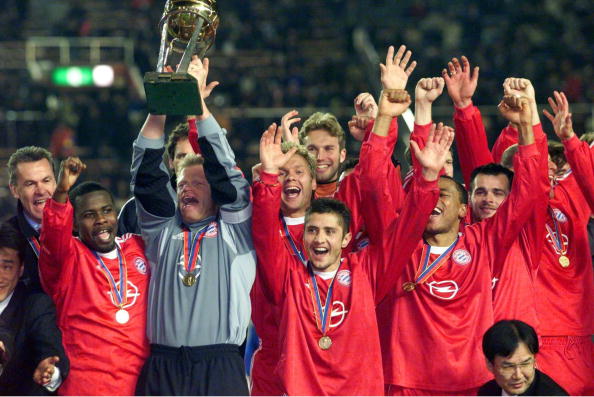
(Photo: Alexander Hassenstein/Bongarts/Getty Images)
It was the case of running out the clock for Bayern thereafter, as they kept their perfect record at the stage. Getting over his early scare, Kuffour named the best player of the match before his deserved BBC’s African Footballer of the Year award. Boca Juniors returned to the summit two years later when they beat AC Milan in a penalty shoot-out, making Bianchi the only manager to win the competition three times.
Little bit of everything
By all means, the 2001 squad was inferior to the other great Bayern sides who brought the European Cup and World Club Cup trophies to Munich. They conceded more than a goal per match en route to the league title. There was nothing that resembled Beckenbauer’s aura or Robbery’s trickery. Elber averaged a goal every other game in his six-and-a-half-year stay at the club, but his 2001 return was far from his best in Bavaria. The fact that French fullback Bixente Lizarazu and Paulo Sérgio, who only played 22 (group stage) minutes in Brazil’s 1994 title, were the only players to have won the World Cup speaks volume for itself.
But there was a good mixture of players determined to seize the opportunity. Other than Kahn, who won UEFA’s best goalkeeper award for four successive years in that era, it was hard to spot a superstar in the team. There was no shortage of characters who would push the limit either for their team or individual desire, however. That season alone showed that Kahn, Effenberg and Jancker have no problems involving in altercations with opponent’s managers and players, not to mention with their own teammates.
With French internationals Lizarazu and Willy Sagnol, Hitzfeld had the perfect wingbacks at his disposal to implement his system. From the young prodigy Roque Santa Cruz to experienced winger Paulo Sérgio, there were enough options for Hitzfeld to look at his bench in dire times. The young sensation Hargreaves and Scholl were the two creative players, as what would happen if Mario Basler stayed longer is best left to imagination.
Unfortunately, both players failed to build on their success stories. Hargreaves’ long-awaited move to England materialized after his magnificent performance in the 2006 World Cup, but his injury-prone time in Manchester was a huge disappointment considering the early prospect. Scholl couldn’t keep his upward trajectory after the Champions League final, and he lives to regret missing to represent his nation on the biggest stage, the World Cup.
Although Jeremies is another player whose career damaged by injuries, he made it to the 2002 World Cup, and played in the final defeat against Brazil. Germany recorded narrow knockout stage wins against perennial underdogs Paraguay, USA and South Korea before Ronaldo’s brace put a dent on Kahn’s otherwise glittering career. The unspectacular manner Rudi Völler’s team reached the World Cup final – between two European Championships’ group stage exits – resembled Bayern’s road to the Champions League triumph.
You might struggle to find silky touches from Jeremies and Hasan Salihamidzic — who was also a mainstay — but you could never question their work rate and the positive effect they brought to the team. After the home colossal to Chelsea in the 2013 final, Hoeneß mentioned Jeremies – who was still at the hospital when his teammates out celebrating the title – when he blamed the defeat on the team’s mentality and fighting spirit. As the old saying goes, the whole is greater than the sum of its parts.

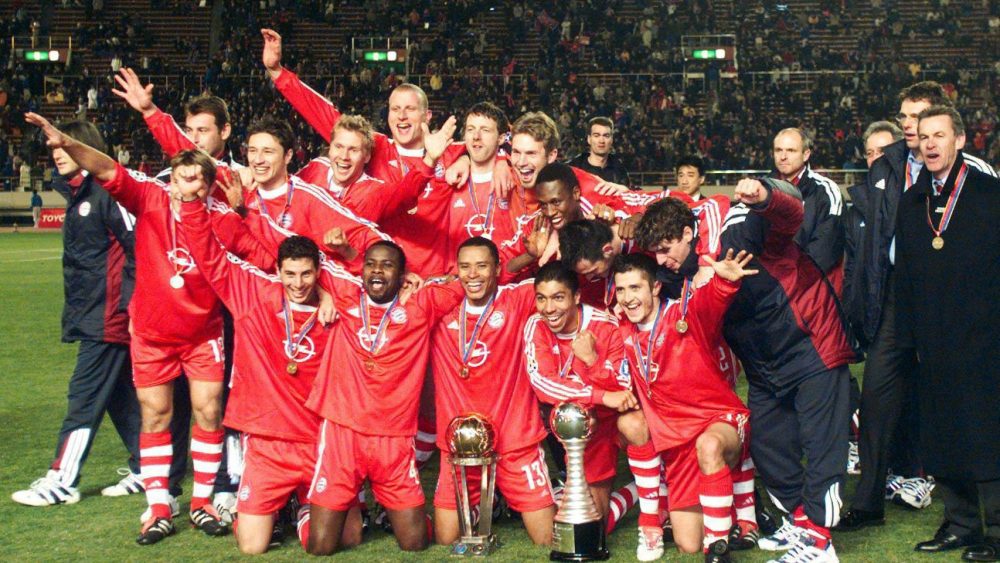






[…] kleines Highlight war der Sieg des Weltpokals am 28. November gegen Boca Juniors durch einen Kopfball von Samy Kuffour in der Verlängerung. Dank […]